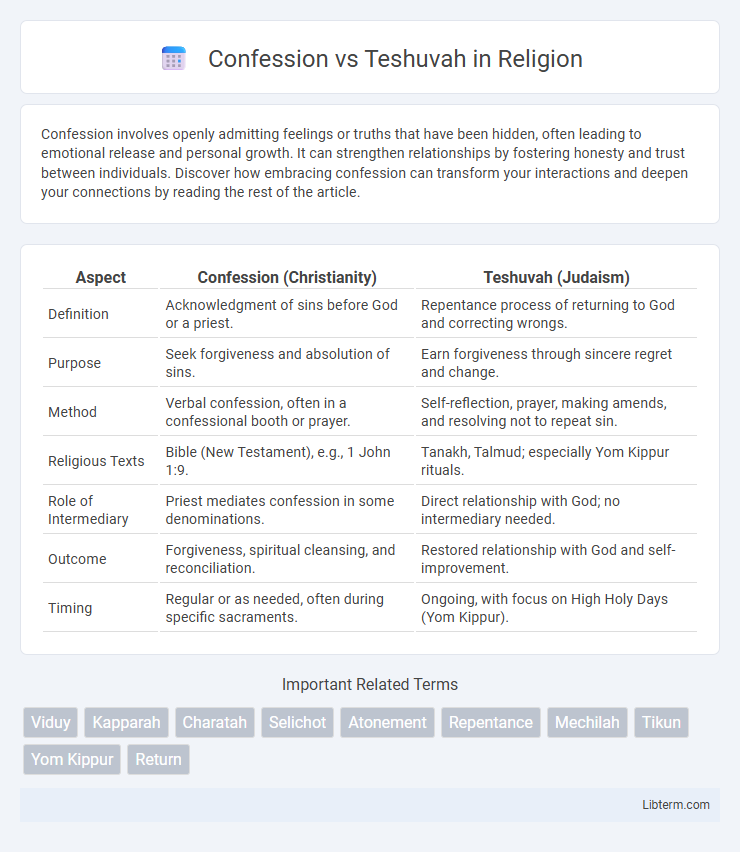Confession involves openly admitting feelings or truths that have been hidden, often leading to emotional release and personal growth. It can strengthen relationships by fostering honesty and trust between individuals. Discover how embracing confession can transform your interactions and deepen your connections by reading the rest of the article.
Table of Comparison
| Aspect | Confession (Christianity) | Teshuvah (Judaism) |
|---|---|---|
| Definition | Acknowledgment of sins before God or a priest. | Repentance process of returning to God and correcting wrongs. |
| Purpose | Seek forgiveness and absolution of sins. | Earn forgiveness through sincere regret and change. |
| Method | Verbal confession, often in a confessional booth or prayer. | Self-reflection, prayer, making amends, and resolving not to repeat sin. |
| Religious Texts | Bible (New Testament), e.g., 1 John 1:9. | Tanakh, Talmud; especially Yom Kippur rituals. |
| Role of Intermediary | Priest mediates confession in some denominations. | Direct relationship with God; no intermediary needed. |
| Outcome | Forgiveness, spiritual cleansing, and reconciliation. | Restored relationship with God and self-improvement. |
| Timing | Regular or as needed, often during specific sacraments. | Ongoing, with focus on High Holy Days (Yom Kippur). |
Understanding Confession and Teshuvah
Confession (Vidui) is the verbal acknowledgment of specific wrongdoings, serving as an essential step in the process of Teshuvah, which means repentance or return to a righteous path. Teshuvah encompasses not only confessing sins but also feeling genuine remorse, ceasing the wrongful behavior, and resolving to improve future actions. This comprehensive process aims to restore a person's relationship with God and others through sincere self-reflection and ethical transformation.
Historical Roots of Confession in Religion
Confession, rooted in ancient religious traditions such as Judaism and Christianity, involves the acknowledgment of sins or wrongdoings before a deity or religious authority, serving as a path to spiritual cleansing and forgiveness. In Judaism, the practice of confession (vidui) is integral to Teshuvah, a comprehensive process of repentance that includes regret, confession, and commitment to change, emphasizing personal responsibility and ethical transformation. Christianity's formalized confession developed through early Church teachings, evolving into the sacrament of penance, highlighting both public admission and divine absolution as means to reconcile with God and the community.
The Concept of Teshuvah in Jewish Tradition
Teshuvah in Jewish tradition is the profound process of repentance that involves sincere remorse, verbal confession (vidui), and a committed return to ethical behavior according to Halacha. Unlike mere confession, Teshuvah requires actionable steps to rectify wrongdoings, emphasizing personal transformation and mending relationships with both God and fellow humans. Central texts such as the Talmud and Rambam's Mishneh Torah detail Teshuvah as a dynamic spiritual journey integral to Yom Kippur observances and daily ethical conduct.
Key Differences Between Confession and Teshuvah
Confession (Vidui) primarily involves verbally acknowledging sins or wrongdoings, which serves as the first step in the repentance process. Teshuvah encompasses a broader spiritual transformation, including sincere remorse, cessation of the sin, and a firm commitment to future ethical behavior. While confession is a momentary act, Teshuvah requires ongoing personal change and restoration of one's relationship with God and others.
Psychological Impact of Confession
Confession in religious contexts serves as a crucial psychological mechanism by allowing individuals to articulate guilt and shame, leading to emotional relief and reduced anxiety. Research shows that the act of verbalizing wrongdoings fosters self-awareness and accountability, which are key components of cognitive restructuring and behavioral change. While Teshuvah encompasses broader steps of repentance including remorse and resolution, confession specifically initiates this transformative psychological process by confronting inner conflicts and promoting mental health.
The Spiritual Process of Teshuvah
Teshuvah represents a profound spiritual process in Jewish tradition, encompassing sincere regret, confession (vidui), and a commitment to change one's behavior to realign with divine will. Unlike mere confession, teshuvah involves deep introspection and transformative repentance that heals the soul and restores one's relationship with God. This process requires acknowledging wrongdoing, expressing remorse, and actively pursuing righteous actions to achieve spiritual renewal and reconciliation.
Confession in Modern Religious Practice
Confession in modern religious practice serves as a vital ritual for acknowledging personal faults and fostering spiritual humility, often performed through structured prayers or communal settings. It facilitates emotional relief and moral accountability, promoting reconciliation between the individual and the divine. Emphasizing verbal admission, confession acts as a preparatory step toward teshuvah, the deeper process of repentance and transformation.
Teshuvah: Steps Toward Genuine Repentance
Teshuvah, central to Jewish ethical teachings, involves sincere remorse, verbal confession (viduy), and concrete actions to rectify wrongdoing, distinguishing it from mere confession. The process requires cessation of the wrongful act, resolution not to repeat it, and making amends where possible, emphasizing personal transformation. This multi-step framework fosters genuine repentance by combining acknowledgment of sin with proactive change and restitution.
Comparative Analysis: Confession vs Teshuvah
Confession (Vidui) in Jewish tradition involves the verbal admission of sins as a crucial step toward spiritual cleansing. Teshuvah, meaning "return," encompasses confession but extends to sincere repentance, remorse, and a commitment to change behavior, representing a holistic process of spiritual restoration. Confession is a component of Teshuvah, yet Teshuvah's transformative power lies in its active pursuit of ethical improvement beyond mere acknowledgment of wrongdoing.
Integrating Confession and Teshuvah in Personal Growth
Integrating confession (vidui) and teshuvah (repentance) fosters profound personal growth by promoting self-awareness and accountability for one's actions. Confession involves a sincere admission of wrongdoings, enabling individuals to confront their flaws honestly, while teshuvah guides the transformative process of remorse, restitution, and behavioral change. Together, these practices create a holistic framework for ethical development and spiritual renewal in Jewish tradition.
Confession Infographic

 libterm.com
libterm.com